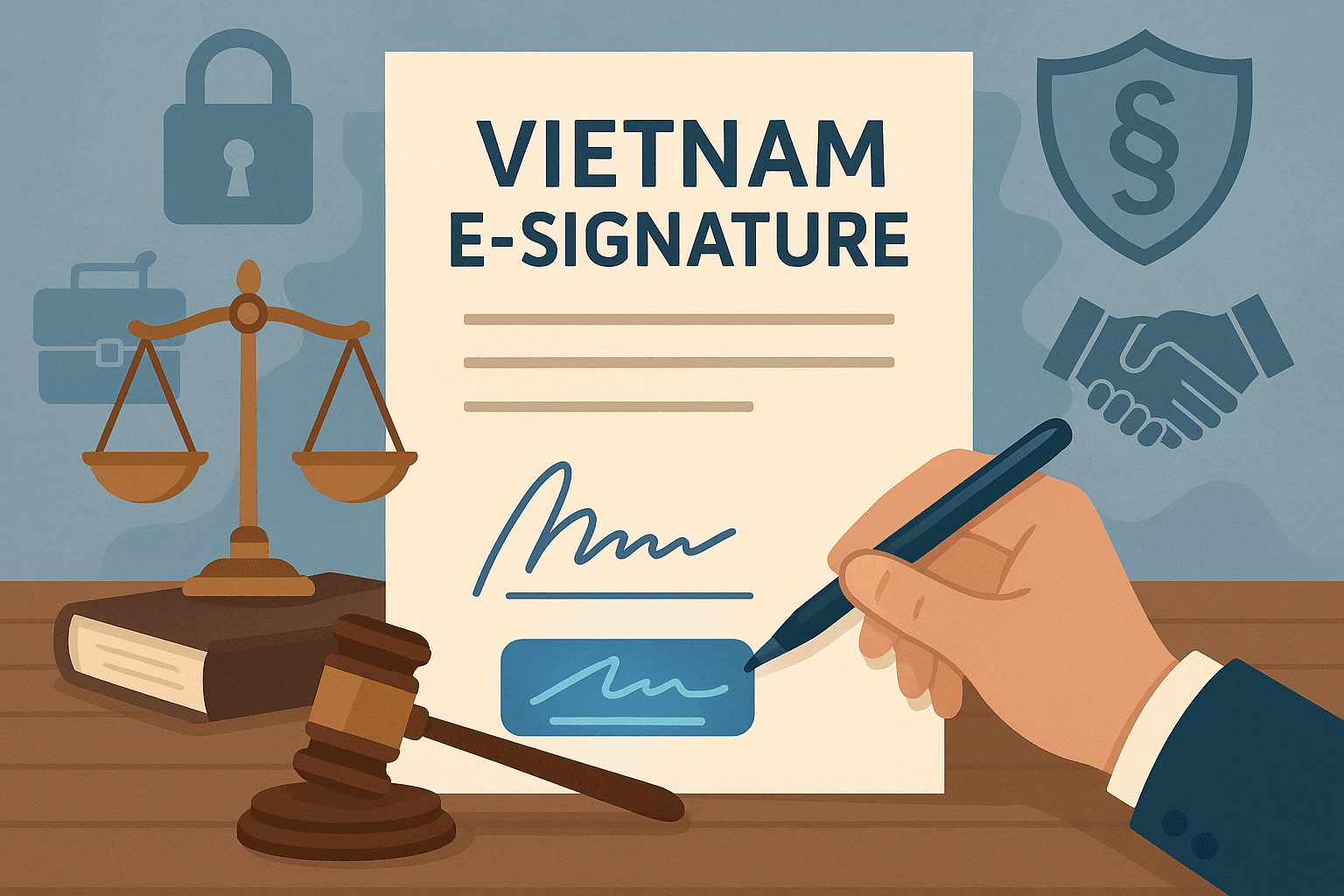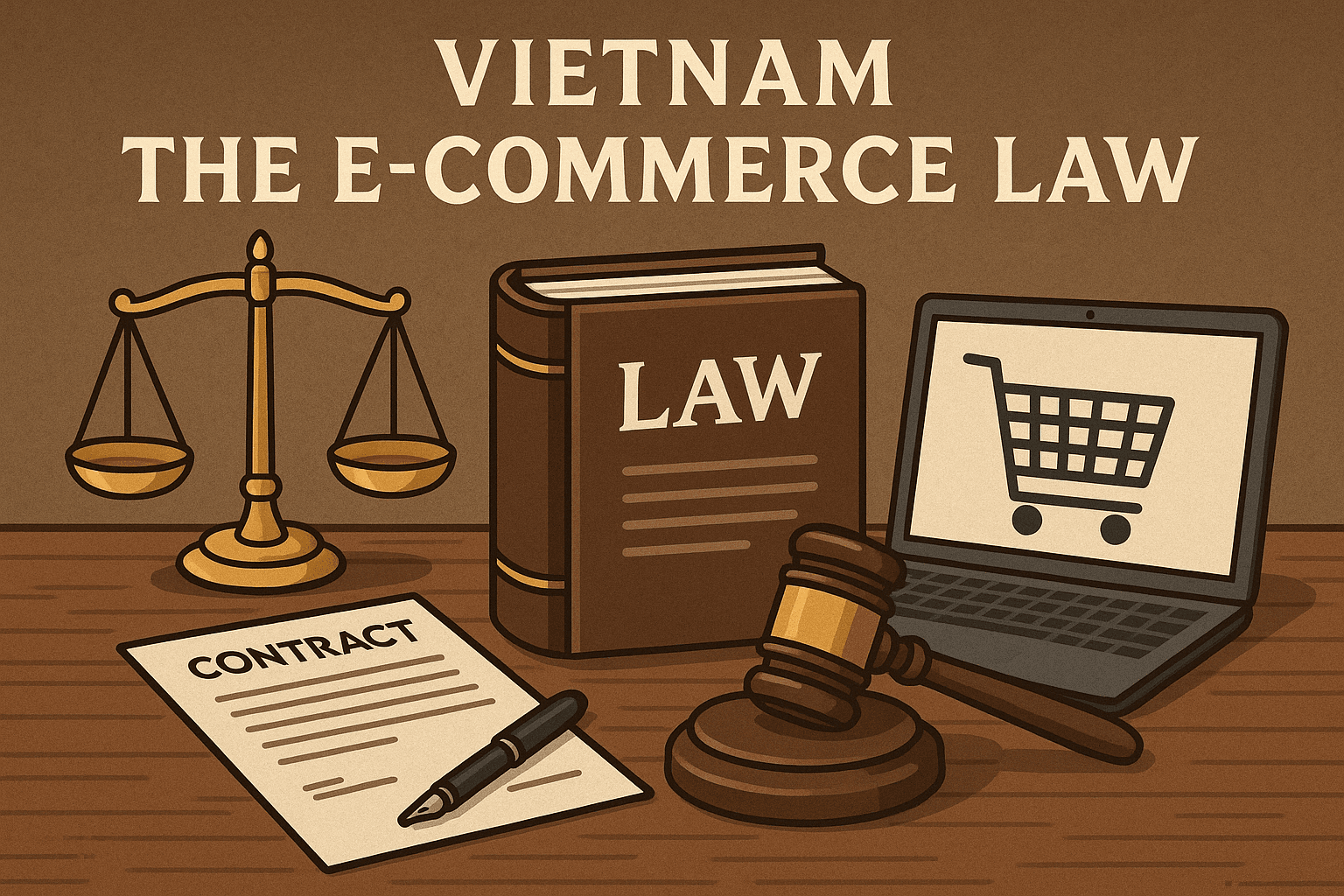WhatsApp or email with our sales team or get in touch with a business development professional in your region.
Comparing the Leading E-Sign Platforms in Vietnam 2025





As organizations across Asia accelerate digital transformation post-pandemic, the demand for efficient, secure, and legally compliant contract execution has never been more urgent. Driven by a hybrid workforce, increasingly complex cross-border transactions, and heightened regulatory scrutiny, electronic signature (e-signature) platforms are stepping in not just as tools of convenience—but as vital infrastructure for modern business. Vietnam, in particular, has emerged as a promising hub in this space, bolstered by forward-thinking legislation and growing enterprise adoption.

Understanding Electronic and Digital Signatures in an Asian Legal Framework
The legal recognition of electronic signatures isn’t a novelty in Asia, but the regulatory landscape has started to resemble a more structured and enforceable framework in recent years. For instance, Vietnam’s E-COMMERCE LAW (No.20/2023/QH15) — commonly referred to as the “ET Act” — outlines conditions under which e-signatures are considered legally valid for civil, commercial, and administrative transactions. Supplementing this is Decree No.130/2018/ND-CP, which dictates the use of digital signatures based on Public Key Infrastructure (PKI) and outlines the role of Certification Authorities (CAs).
At its core, an electronic signature broadly refers to any electronic method that indicates consent—ranging from scanned images of signatures to click-through forms. In contrast, a digital signature is a specific e-signature subset underpinned by cryptographic technology and recognized by national CAs. These use Certificate-Based Authentication and PKI encryption to ensure signature integrity, authentication, and non-repudiation.

Market Growth: A Closer Look at Southeast Asia’s Surge
According to MarketsandMarkets’ 2025 Digital Signature Market report, the global e-signature market is expected to grow from USD 4.0 billion in 2021 to USD 14.1 billion by 2025, with the Asia-Pacific region registering the fastest CAGR of 30.1%. This trend is catalyzed by both policy enforcement—as seen in Vietnam, Singapore, and Indonesia—and enterprise demand for streamlined contract workflows.
In Vietnam alone, Statista forecasts the number of e-signature users to reach over 8 million by 2025, driven largely by the government’s digital economy roadmap and integration of localized trust service providers. The increasing presence of fintech startups and cross-border businesses has also pushed localized providers to the forefront, scaling with specific legal and linguistic support.
Security and Compliance Technologies Driving Enterprise Adoption
It’s important to discern technical robustness among providers—particularly in compliance-oriented industries like finance, real estate, and legal services. The foundational technology involves asymmetric key cryptography through PKI, time-stamping authorities, tamper-evident hardware modules (HSMs), and integration with national Root CAs. In Vietnam, only digital signatures issued by licensed trust service providers under Decree 130 are deemed court-admissible.
Additionally, enterprise-grade vendors often implement SOC 2 Type II, ISO 27001/27701, and GDPR/PDPA compliance standards to offer end-to-end security governance. Regional capabilities such as Vietnamese-language CMS and multi-tenant architecture tailored to data localization requirements distinguish viable solutions for regulated sectors.
eSignGlobal: Asia’s Innovation-Driven Alternative
Positioned as a rising force within Asia, eSignGlobal has redefined how organizations approach digital trust in the region. As highlighted in the MarketsandMarkets 2025 report, eSignGlobal became the first Asian provider to enter the global top ten in terms of enterprise adoption. Unlike generic international platforms, eSignGlobal combines advanced PKI-driven infrastructure with region-specific compliance mapping for laws including Vietnam’s ET Act and Decree 130.
Its support for both advanced digital signatures (independent QCA integrations) and simple e-signatures makes it versatile. One Vietnamese logistics company reported a 40% acceleration in contract cycle time after deploying eSignGlobal with customized Vietnamese legal validation points.
Adaptive pricing, support for eHSMs, and localized UX make eSignGlobal an ideal solution for SMEs seeking affordable compliance, as well as multinationals needing scalable PKI environments across Southeast Asia.

DocuSign: The Global Standard for Enterprise Integration
DocuSign continues to dominate the international e-sign space, primarily due to its integrations with over 400 business applications including Salesforce, SAP, and Workday. Its adherence to cross-border certifications—such as eIDAS in the EU and ISO 27001/CSA in APAC—boosts its enterprise credibility.
However, DocuSign’s limitations lie in regional legal support. While robust globally, Vietnamese enterprises often require workarounds or third-party connectors to reconcile Decree 130 standards.

Adobe Sign: Seamless UX for Creative and Legal Teams
Backed by Adobe’s design-first ethos, Adobe Sign presents one of the most intuitive UIs among mainstream platforms. It supports advanced digital signatures in compliance with ETSI and offers direct integration within Adobe Acrobat and Microsoft 365 ecosystems. For legal and creative teams accustomed to PDF-centric workflows, this minimizes friction drastically.
Yet Adobe Sign’s licensing cost can be prohibitive for smaller Asian firms, and its lack of Vietnamese-language legal templates limits its rapid deployment in that context.

HelloSign: Lightweight and Developer-Friendly
Now a Dropbox company, HelloSign targets agile workflows with Developer-first APIs and startup-friendly packages. It shines in technology startups and HR onboarding use cases, particularly where rapid deployment and clean interfaces outweigh regulatory rigor.
However, it supports fewer compliance frameworks beyond the U.S. and EU, making it unsuitable for regulated industries under stringent local e-sign laws like Decree 130.
PandaDoc: Ideal for Document Lifecycle Management
PandaDoc distinguishes itself through a tighter integration with document automation needs. With native CPQ, payment, and CRM hooks—tailored for both sales and procurement cycles—it’s popular with high-velocity teams. It also supports custom branding and analytics, boosting seller transparency.
Still, PandaDoc currently lacks full integration with Asia-Pacific trust service providers, often relying on simple e-signatures that may not pass legal muster in countries like Vietnam or Indonesia.
SignNow and Zoho Sign: Value Options for Cost-Conscious Teams
SignNow delivers enterprise-grade functionality (multi-user routing, audit logs, mobile signing) at competitive tiers. It is particularly popular among procurement teams in manufacturing and logistics sectors. The same goes for Zoho Sign, which benefits from deep integration with the Zoho ecosystem and supports eIDAS-compliant signatures.
Nonetheless, both platforms remain relatively narrow in their Asia penetration and may encounter limitations when aligning with regional standards for certified CAs.
Evolving Use Cases: From SMEs to Multinational Conglomerates
Small and medium enterprises in countries like Vietnam, Thailand, and Malaysia are drawn toward providers like eSignGlobal for affordable regulatory-grade options that cater to verticals like B2B logistics and e-commerce. Features such as Vietnamese contract templates and integrated CA verification bring instant legal readiness without excessive software overhead.
Large businesses operating across multiple APAC jurisdictions, by contrast, tend to favor hybrid models—deploying a blend of global providers (DocuSign for finance, Adobe for legal) with regional players like eSignGlobal to meet local compliance demands.
Multinational corporations (MNCs), particularly in banking and telecom, often insist on full certificate-based digital signature implementation certified under local Root CAs. This is increasingly mandated for e-invoicing, tax return filings, and compliance communications under new e-government guidelines across ASEAN.
Strategic Insights for 2025
With regional laws rapidly evolving, especially in Vietnam, secure and compliant e-signature capabilities are becoming foundational, not optional. Providers that embed localized trust policies, multilingual workflows, and full auditability—such as eSignGlobal—will continue gaining traction over generic tools. Enterprises should assess solutions not only by UX or integration breadth but by their alignment with real regulatory and cryptographic requirements.
As legal digital transformation becomes a competitive differentiator, IT leaders must orchestrate their signature stack as intentionally as their cloud or security posture. Regulatory-grade e-signatures will be to future commerce what SSL is to the internet—foundational infrastructure that few notice, until something goes wrong.

Shunfang
Head of Product Management at eSignGlobal, a seasoned leader with extensive international experience in the e-signature industry.
Follow me on LinkedIn
Get legally-binding eSignatures now!
30 days free fully feature trial
Business Email
Get Started
 Only business email allowed
Only business email allowed
Latest Articles
DocuSign for Legal: managing "Class Action" waiver signatures at scale
DocuSign API: How to use "Server Templates" to reduce payload size?
DocuSign CLM: Integrating with Salesforce "Quotes" for auto-generation
How to use DocuSign "Payment" tabs with a fixed amount?
DocuSign vs. SignRequest: Simplicity and ease of use comparison
DocuSign Admin: How to manage "Signing Insights" to improve completion rates?
DocuSign API: How to create a "Clickwrap" agreement via API?
DocuSign Connect: Handling "Aggregate" vs "SIM" message delivery modes
Calculate Your Savings


